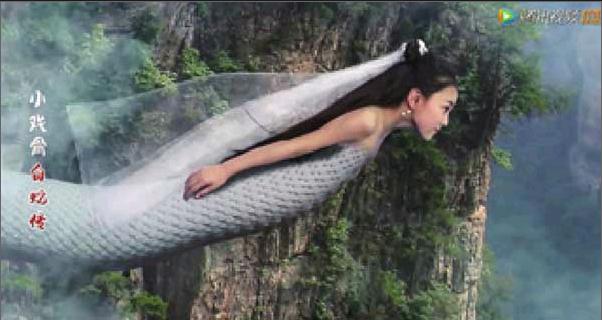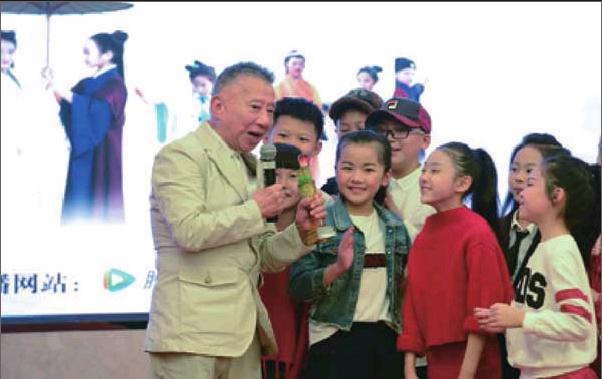Classics Repackaged
2016-12-21ByPanXiaoqiao
By+Pan+Xiaoqiao


Remaking classic TV series and films is hard- ly a new trend. Numerous reproductions, featuring movie stars and costing huge amounts of money, have been screened over the past few years. Audiences tend to be quite critical of the new versions, often comparing them unfavorably with the original ones. Viewers typically gripe about nonsensical aspects of the plot, poor acting skills or excessive commercialization of the productions.
In October, however, a TV reproduction of a classic tale broke the mold and stirred up great passion among viewers by virtue of its unique format: all of the roles are played by children aged between 6 and 12. Within days of being put online, the series received over 100 million hits, according to Tencent, the productions exclusive Web broadcaster.
The work is based on a folktale hundreds of years old called Legend of the White Snake, or White Snake Lady, which has been adapted for TV in a number of versions. The 1992 Taiwan production, starring Hong Kong actresses Angie Chiu and Cecilia Yip, was so successful that TV stations across China still show reruns.
None of the later versions had kindled as much audience interest until the latest repro- duction came along. On Douban, a popular social media platform for TV, film, music and book lovers, the recent production of White Snake Lady has garnered a rating of 8.8 points out of 10, while the 1992 version scored 9 points.
Compared with the 50-episode original, the new version is extremely condensed, lasting merely 100 minutes in total. Nevertheless, this new, five-episode version presents a cohesive narrative and closely follows the original story.
Dedication bears fruit
White Snake Lady, handed down for generations, is familiar to almost every Chinese. The story is set in east China during the Song Dynasty (960-1279). A snake saved from death by a man spends eons cultivating itself into a human being. After transforming to appear as a beautiful woman, named Bai Suzhen, the snake comes to the world of mortals to show her gratitude to Xu Xian, the kindhearted youth who saved her life in his previous incarnation. The love between a human and a snake, however, offends Fahai, a high-ranking monk with supernatural powers, who discovers Bais true nature, and he incarcerates Bai in a pagoda. Only after her son, Xu Shilin, wins the top spot in the national imperial examination some 20 years later is Bai rescued from the pagoda and the whole family reunited.
Many viewers have commented that initially they did not expect to see anything serious in a TV series featuring child actors, but after watching it, they were impressed by the acting skills of the children.
Ma Yan, an editor and the father of a 5-yearold, said, “I first heard about the childrens version through WeChat, where some friends had re-posted excerpts. At first, I just found it amusing to see children playing all the roles in a TV production. But later, I was totally captivated by their performances, and I burst into tears several times such as when Xu Shilin pleads for the release of his mother from the pagoda. My daughter was attracted by the fabulous story and also the little actors. I can feel that the children worked very hard and were very devoted to their performances.”
The latest version was made for a TV program called Xiao Xigu (Little Artists), aired on Hunan TV. The program, which began in December 2015, features only child performers.
On the topic of White Snake Ladys great success, Xiao Xigu general director Pan Liping said that while an attractive story is important, performers hard work and devotion are essential for a successful production.
At a series-launch press conference on October 16, Tao Yixi, the girl who played the role of Bai, broke down in tears in front of the audience as she recalled the hardship she endured during production. “At first, I could not meet the directors performance requirements, and I found the others acted very well, so I had to make a lot of extra effort. But Im glad my hard work finally paid off.”
According to Pan, before shooting began, the child actors were required to watch the 1992 version dozens of times. Every part of the plot and every line were carefully rehearsed. Professional acting and voice coaches trained the children. While the shooting itself took just one month, rehearsals took around four months. “After intense practice, the children acted naturally, based on their understanding of the work, instead of mechanically simulating the classic version,” said Pan.
Pan also mentioned that the use of child actors in roles traditionally reserved for professional adult performers brings an element of surprise and a sense of freshness. “This may also partly explain why this version has attracted so many viewers,” the director said.
Spurred on by the success, Xiao Xigu plans to bring out two more reproductions in the near future: Journey to the West, a popular tale based on an eminent Tang Dynasty (618-907) monks pilgrimage to India, and Hua Mulan, the story of a legendary female warrior which has already been adapted into a Disney animation.
Advocating traditional culture
Apart from White Snake Lady, Xiao Xigu has produced several other dramas including Liu Sanjie, a story about a maiden good at singing folk songs who lived 1,000 years ago, and WhiteHaired Girl, a revolutionary opera created in the 1940s.
The program intends to inspire childrens interest in traditional culture by enabling them to experience it through playing characters from certain classics in TV adaptations, said Pan.
Pan mentioned his concern about the younger generations lack of interest in Chinas traditional culture. “We decided to find an appropriate way that can attract them to Chinas own culture.”
“To be so deeply involved in classic works is a very good method of education, and it is much more helpful for these children than forcing them to read masterpieces in the classroom,” said Yang Ping, a music teacher at a high school affiliated with Hunan Normal University.
Meng Yu, who played the heroine in the decades-old opera version of White-Haired Girl, said, “Its a pity to see that so many children nowadays are addicted to pop culture and ignore our classics. Xiao Xigu, to some extent, is shouldering the responsibility of passing on fine traditional culture to children.”
Since the program was aired, tens of thousands of primary school students, either by themselves or through their parents, have contacted the producers of Xiao Xigu to audition for the shows.
Xiao Xigu is not only helping its young actors to learn more about classics, but has also stirred up waves of enthusiasm for traditional Chinese culture among millions of children across the nation.
However, besides being flooded with praise, Xiao Xigu, as a trailblazing TV program, has also come under fire for its format.
Most of the critics argue that works like White Snake Lady and Liu Sanjie are not suitable for child actors, as they contain romantic scenes. Children cannot understand the complex emotions of love between adults, and exposing them to the topic at such a young age is detrimental.
Pan, however, said all the scenes concern- ing love and romance had been cut. The latest version differs from previous ones, which center on the love between two adults, by focusing on family bonds, friendship and the filial piety of the couples son, Xu Shilin.
As the new production has rocketed to fame, its child performers have been thrown into the spotlight, sparking concern about the creation of a child movie star production line, as some entertainment companies have already expressed a desire to partner with Xiao Xigu.
In response, Pan said the program is a notfor-profit project and will never get its child actors involved in commercial activities. In contrast to the programs tremendous popularity, its budget is small, with each episode costing just a few thousand yuan. “We do not aim to make movie stars. We just want to help children get to know and feel keenly the beauty and philosophy in Chinas traditional classics.”
Parents of children who have taken part in Xiao Xigu have said they sent their children to audition for the roles not out of dreams of stardom, but to enable the children to improve their understanding of traditional culture.
Judging carefully how much child performers can be exposed to adult stories and striking a balance between the programs not-for-profit objective and commercial development will be key to the programs future success.
